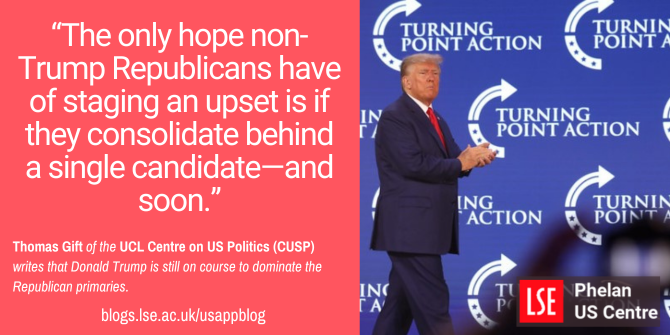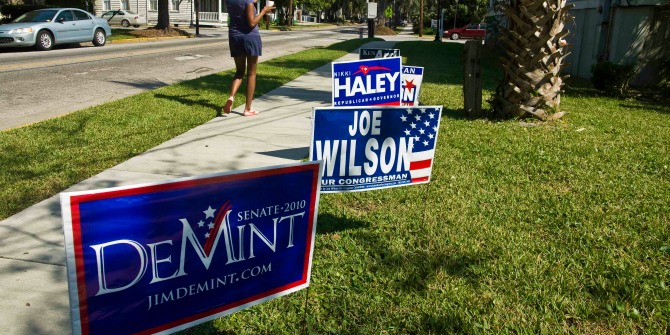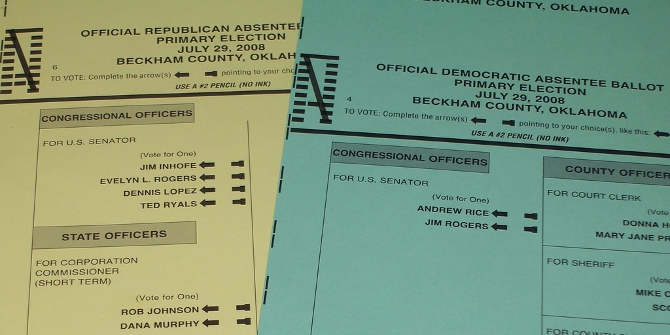 With the first-in-the nation Republican primaries, the Iowa caucuses, less than six weeks away, it’s the final stretch for candidates hoping to erase Donald Trump’s commanding lead. In this Q&A, Thomas Gift breaks down the nomination race, assesses the campaigns of Trump’s main competitors, Nikki Haley and Ron DeSantis, and explains why the prospects of anyone toppling Trump remain slim.
With the first-in-the nation Republican primaries, the Iowa caucuses, less than six weeks away, it’s the final stretch for candidates hoping to erase Donald Trump’s commanding lead. In this Q&A, Thomas Gift breaks down the nomination race, assesses the campaigns of Trump’s main competitors, Nikki Haley and Ron DeSantis, and explains why the prospects of anyone toppling Trump remain slim.
What’s the state of the Republican primaries? Is there any chance at all that Trump could be upset in Iowa in January?
The media seems desperate to try to make a horse-race out of Iowa. And it is notable that a recent poll showed that almost 80 percent of Iowa Republicans said that they’d at least be open to voting for a candidate not named Trump. But, in the end, Trump was absolutely right when he declared at the end of October, in his typical bravado, that that “there’s no way Iowa is voting against Trump.” Just look at the data: Trump is nearly 30 percentage points up over Florida governor, Ron DeSantis, and former South Carolina governor, Nikki Haley. That’s not a primary. That’s a shellacking. So, what really matters in Iowa isn’t first place, but who the runner up is. The only hope non-Trump Republicans have of staging an upset is if they consolidate behind a single candidate—and soon. Because right now, the field is too crowded, and there’s too much noise, for Trump to face any serious challenge. This means that whoever comes in second in Iowa will need to do it in convincing enough fashion that there’s a consensus alternative heading into New Hampshire. A razor thin second-place finish won’t be sufficient.
If second place is what matters, then who will it be?
If you’re looking for a growth stock right now, it’s definitely Nikki Haley. That doesn’t mean her bubble won’t burst. It almost certainly will. But Haley is riding the momentum much more than DeSantis, and she’s peaking at the right time. This is for a few reasons. First, the general consensus is that Haley has performed well in the debates. Second, I think she’s been more successful at finding common ground on hot-button issues like abortion, which has become a real Achilles heel for Republicans of late. Third, and not unrelated to those two points, she’s won the endorsement of the deep-pocketed Koch network, an influential set of conservative donors. That shouldn’t be underestimated. The Koch network has both vast sums of money and an unmatched ability to tap into grassroots organizers. Especially in the early primary states, where a lot of success comes from pounding on doors and local canvassing, an effective ground game is essential. If the goal isn’t necessarily to beat Trump, but simply to have a strong runner-up finish, that might be enough to propel Haley over DeSantis.
Speaking of DeSantis, how’s his campaign going?
In short, not well. That’s not to say he’s completely out of it. Within the last few weeks, DeSantis did earn two key endorsements in Iowa: first, from popular governor Kim Reynolds (which prompted Trump to blast her “disloyalty”), and second, from Bob Vander Plaats, a well-known Christian leader in the state. DeSantis is polling virtually neck and neck with Haley in Iowa. But he’s also put almost all his eggs into the state’s proverbial basket. So, if he has a disappointing showing, it’s hard to see him regrouping for New Hampshire, much less for Haley’s home state of South Carolina. DeSantis’s campaign just never found its stride. Part of that could have been over-hyped expectations, where everyone thought he was going to be Trump’s foil from the start. But I think it’s mostly just a function of voters not wanting a “Trump-lite” candidate. In some ways, you can understand DeSantis trying to run around Trump, not through him. But as comedian Bill Maher has quipped, Republican voters aren’t going to want a Trump tribute band when the real one is still playing.

“Donald Trump” (CC BY-SA 2.0) by Gage Skidmore
The talk of the town last week was DeSantis’s Fox News debate with California Democratic Governor Gavin Newsom. What did you make of that?
On the substance, I thought it was the best debate of the season. Granted, that’s not saying much. Most of the GOP debates turned out to be bores, and without Trump, all were irrelevant. But this one had its moments. Because DeSantis and Newsom faced off one-on-one, it had the feeling of a real debate, not just a group press conference. While reviews were mixed, and I don’t think there was a clear winner, I can’t help but think that the debate did reflect some level of desperation for DeSantis. For Newsom, it’s clear why he participated. He’s almost certain to run for president in 2028, so early national exposure can’t hurt. But for DeSantis, it felt more like a sideshow, with the only real goal being to gain more airtime on Fox News. Perhaps the most memorable line ultimately came from Newsom, who told DeSantis there’s one thing they have in common: “neither of us will be the nominee for our party in 2024.” That’s almost certainly accurate, and pretty much sums up the state of the Republican primaries.
Could anything else make a difference in the early Republican primaries?
One question I do have is how long some of the more marginal candidates will stay in the race. Former New Jersey governor Chris Christie, for example, is currently polling at three percent nationally. And Vivek Ramaswamy is at five percent. While that’s not a lot, it’s also not nothing. Ramaswamy looks like he’s running for a Trump cabinet post, or potentially, setting himself up for 2028. For Christie, however, it’s difficult to justify staying in. If his real goal, as he says, is to prevent Trump from retaking the White House, then he’s almost certainly hurting that cause by peeling away votes from Haley and DeSantis. Perhaps he’s doing some damage to Trump by attacking him in ways that no other Republican will. But my sense is he’s largely preaching to the choir. Christie theorized early on that the non-Trump vote in the GOP was bigger than many thought. That’s turned out to be false. So, unless he’s just betting that a Trump nomination really is inevitable (and so he might as well berate Trump because everyone’s campaign is also futile), it’s hard to argue he shouldn’t soon call it quits.
Please read our comments policy before commenting.
Note: This article gives the views of the authors, and not the position of USAPP – American Politics and Policy, nor the London School of Economics.
Shortened URL for this post: https://bit.ly/47IjAr5






